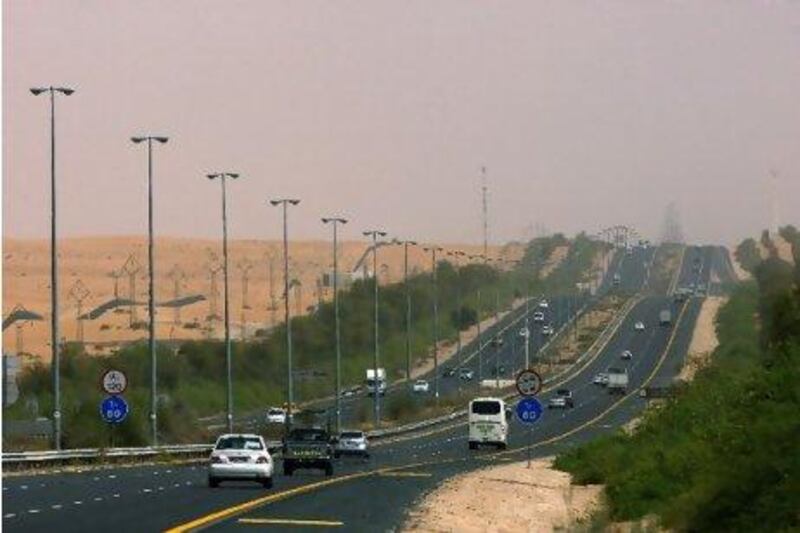DUBAI // The speed limit on one of the most dangerous motorways in the country has been increased to 120 kph from 100 kph, with speed cameras set to flash at 140 kph.
The increase, enacted last month as work on the E66 Dubai-Al Ain motorway neared completion, returns the speed limit to the 2008 maximum.
Many motorists welcomed the increase, but some said it came too soon, as parts of the motorway are still under construction.
More than 90 per cent of the Dh780-million project has been completed, with work scheduled to end in September.
"I am relieved that the speed limits have been returned to 120 kph," said Mohamad Mutere, 28, a banker from Jordan.
"The speed limit was too low. Now that the highway has been widened to three or four lanes, driving at just below 140 kph seems safe."
However, for Dolores Humphries, 39, a housewife from the UK who travels to Al Ain on weekends to visit friends, the increase came too soon.
"On some parts of the highway, 120 kph is fine," she said. "But there are stretches that are still under construction that are two lanes wide. It was bad enough having people zoom past me at 100 kph, now it's worse because the road signs tell you that the cameras will only flash you at 140 kph and above. I have seen drivers drive over 160 kph between the radars."
Zayed al Amri, 41, an Emirati businessman, said: "I was annoyed at having to drive 100 kph on the portions of the highway that were completed. For those portions I felt that driving 120 kph was safe.
"But in the portions that are still under construction that are just two lanes, the speed limits should have remained at 100 kph. Where before people used to pass me at 115 kph, they now pass me at close to 140. The highway should have two speed limits, with cameras programmed to speeds appropriate for that stretch of road. I fear that someone is going to get hurt."
Dubai Police said there were 36 serious accidents involving 55 vehicles on E66 last year, leading to 29 injuries and seven deaths. These represented 3.6 per cent of injuries and 4.6 per cent of deaths on UAE roads last year.
The motorway was ranked the fourth most dangerous in the country. However, after conducting studies, Abu Dhabi Police felt confident enough to raise the speed limit. "Given that construction is almost complete, the decision has been made to return the speed limit to 120 kph," said Brig Gen Hussain al Harthi, director of the force's traffic and patrols division. "We urge all motorists to obey the speed limit and drive safely at all times."
Several speed cameras in place before the construction have been removed, but are to be replaced with state-of-the-art equipment by September, a source said. "The police during this time are relying on the mobile speed cameras to catch speeders," he said.
A road safety expert said more serious wrecks can occur with higher speed limits on motorways.
"It's important to have good signage to warn drivers of changed conditions on the road," said John Hughes, regional manager of ARRB Group Limited, a consultancy. "Higher speeds cause more serious accidents and injuries. Studies and data have proven that."






